
On August 26, 2023, the seminar of "China's 30-Year History of Concluding Extradition Treaties with Foreign Countries: Review and Prospect" was successfully held at the Yingdong Academic Hall of Beijing Normal University. This forum was jointly hosted by the Department of Treaty and Law of the Ministry of Foreign Affairs and the Law School of Beijing Normal University, and organized by the Research Center on International Cooperation Regarding Persons Sought for Corruption and Asset Recovery in G20 Member States. Nearly 100 experts and scholars from practical departments such as the Central Commission for Discipline Inspection, the State Supervision Commission, the Law Working Committee of the Standing Committee of the National People's Congress, the Foreign Affairs Committee of the National People's Congress, the Supreme People's Court, the Supreme People's Procuratorate, the Ministry of Public Security, the Ministry of Justice, as well as institutions of higher learning such as Beijing Normal University, the Chinese Academy of Social Sciences, Jilin University, Tianjin University, Zhongnan University of Economics and Law, Northwest University of Political Science and Law, University of International Business and Economics, Shanghai Academy of Social Sciences, Henan University of Technology, Guangxi Normal University, the Party School of the CPC Hubei Provincial Committee (Hubei Administrative College), Xinjiang University attended the seminar.
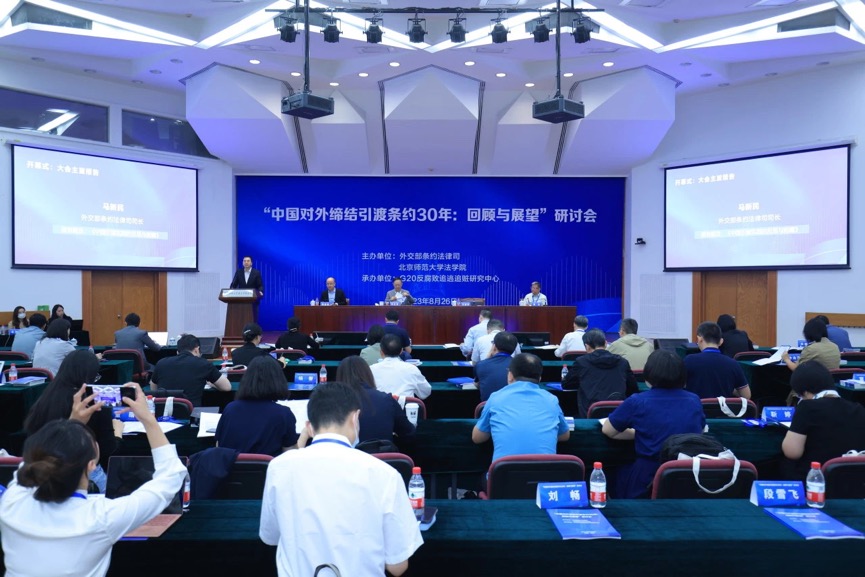
The opening ceremony
The opening ceremony of the seminar was presided over by Liang Yingxiu, Dean of the Law School of Beijing Normal University.
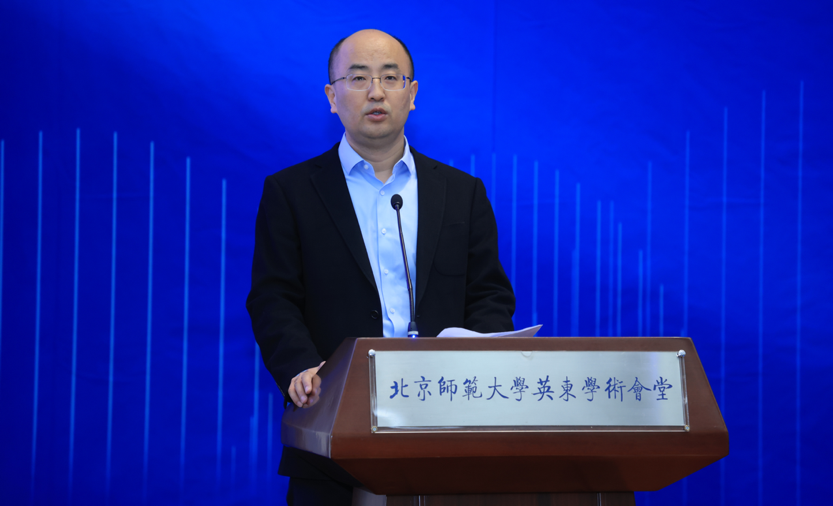
Dean Liang Yingxiu presided over the opening ceremony
Assistant Minister of Foreign Affairs Hua Chunying delivered a video address in which she extolled China's remarkable accomplishments in extradition cooperation with international partners over the past three decades, since the inception of its first extradition treaty with Thailand. Hua highlighted that since the 18th National Congress of the Communist Party of China, significant strides have been made in China's extradition treaty negotiations and enforcement practices, with these efforts increasingly supporting the nation's overall domestic strategy. Despite this progress, she acknowledged that there are still areas of vulnerability within the current framework of international law enforcement and judicial cooperation. Moving forward, Hua emphasized the need to harmonize the advancement of domestic and international rule of law, to expand the legal toolkit, to tighten the web of treaties, to enhance the quality of case management, to focus on talent development, and to support the steady and sustained growth of China's involvement in international law enforcement and judicial cooperation.
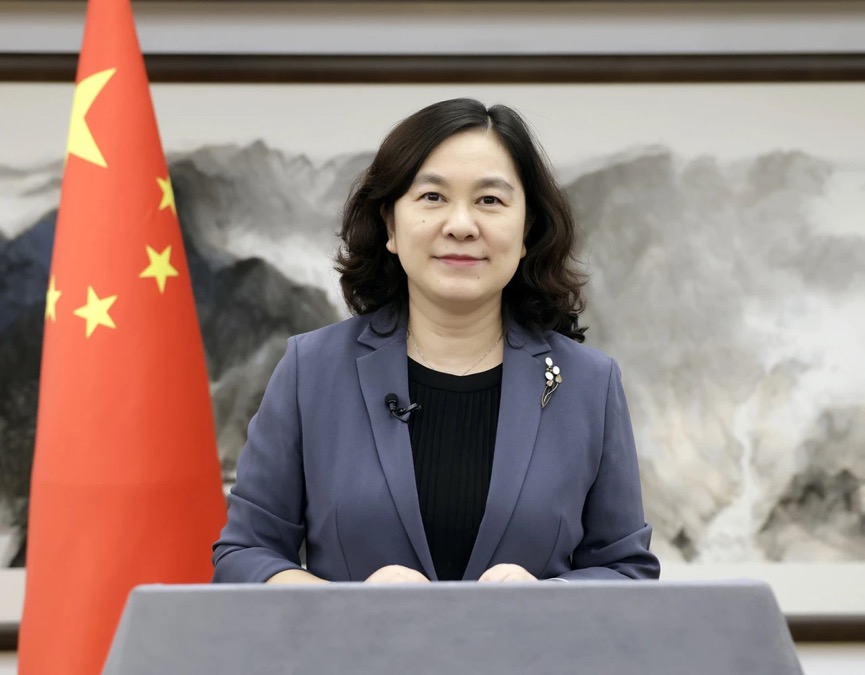
Speech by Assistant Minister Hua Chunying
Sun Hongpei, Deputy Secretary of the Party Committee and Secretary of the Discipline Inspection Commission of Beijing Normal University, fully affirmed the significance of holding this conference in his speech. He introduced the development of Beijing Normal University and its Law School, as well as the Research Center on International Cooperation Regarding Persons Sought for Corruption and Asset Recovery in G20 Member States. He stated that the university will further strengthen the construction of foreign-related law disciplines and the Research Center on International Cooperation Regarding Persons Sought for Corruption and Asset Recovery in G20 Member States, in order to provide stronger academic support for China's foreign-related legal construction and make new and greater contributions to the comprehensive rule of law.
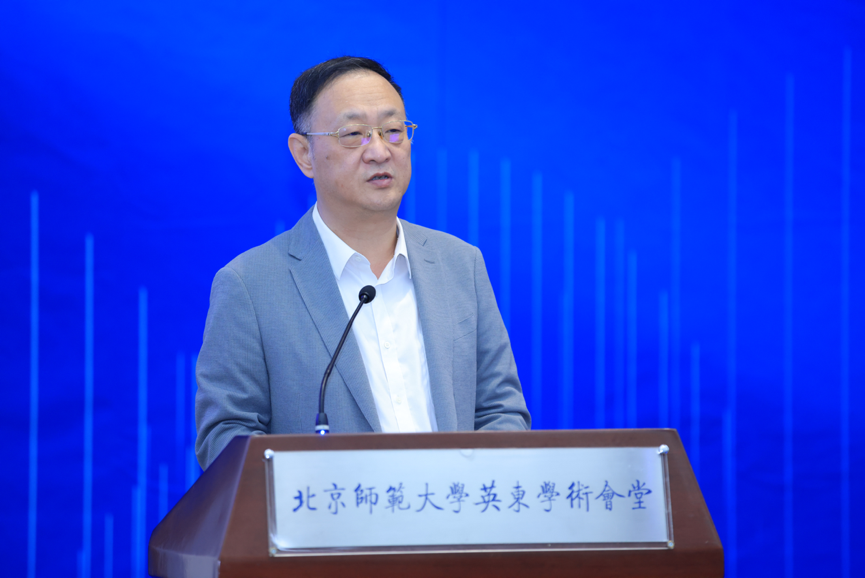
Speech by Vice Secretary Sun Hongpei
Following this, Ma Xinmin, the Director General of the Department of Treaty and Law at the Ministry of Foreign Affairs, and Huang Feng, a Professor at the Law School of Beijing Normal University and Honorary Director of the Research Center on International Cooperation for Corruption and Asset Recovery among G20 Member States, each presented keynote addresses at the conference. In his speech, Director General Ma Xinmin provided a comprehensive overview of the evolution of China's extradition system. He delved into the various challenges confronting China's international extradition cooperation in the current global context and proposed a series of measures for advancement. These included intensifying theoretical research, bolstering capacity-building efforts, enhancing overall coordination, systematically refining the extradition framework, and elevating the standards of treaty negotiation and case management throughout the process. Ma emphasized the importance of narrating the story of China's legal system across various platforms and advocated for the ongoing progress and development of China's extradition endeavors.
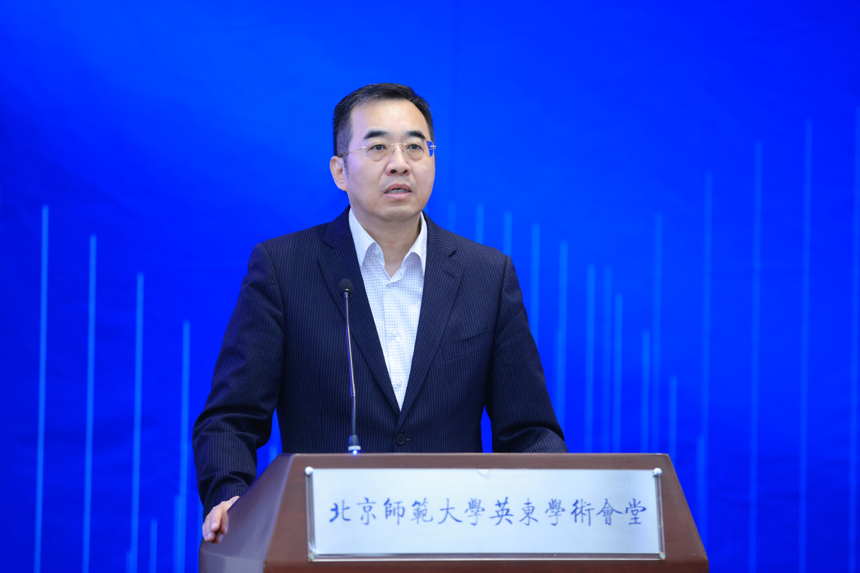
Director General Ma Xinmin delivered a keynote speech
In his keynote address, Professor Huang Feng reflected on his involvement in the negotiation and signing of the Sino-Thai extradition treaty. He analyzed the groundbreaking "three firsts" established by the treaty: it was the first to incorporate the concept of "political offenses" and the principle of non-extradition for political crimes into extradition cooperation; it marked the first instance where language was deliberately left ambiguous concerning the non-extradition of a country's own nationals; and it introduced, for the first time, a system of provisional detention in the context of extradition. These "Three Firsts" underscore the historic importance of the treaty and its innovative contributions to the field of international extradition law.
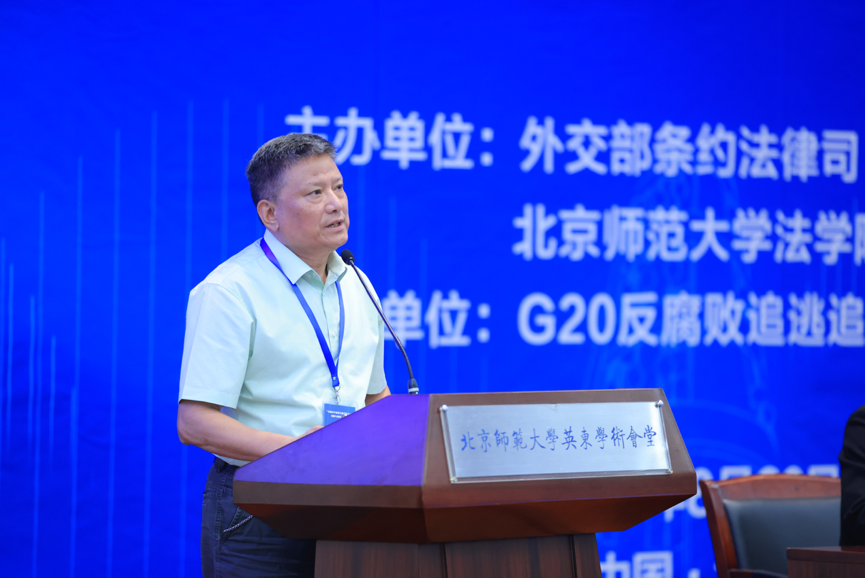
Professor Huang Feng delivered a keynote speech
After the opening ceremony, attending experts and scholars conducted in-depth discussions on three topics: "Achievements and Challenges of 30 Years of Extradition Treaty Negotiation and Conclusion", "Legal Issues in Conclusion of Extradition Treaties with Foreign Countries and Extradition Practice", and "Prospects for International Law Enforcement and Judicial Cooperation".
Topic 1: Achievements and Challenges of 30 Years of Extradition Treaty Negotiation and Conclusion
Seminar on Topic 1 "Achievements and Challenges of 30 Years of Extradition Treaty Negotiation and Conclusion" was chaired by Wang Xiumei, a professor at the Law School of Beijing Normal University, the director of the Research Center on International Cooperation Regarding Persons Sought for Corruption and Asset Recovery in G20 Member States, and vice president of the College for Criminal Law Science of Beijing Normal University. Shi Xiaobin, Director of the Department of Treaty and Law of the Ministry of Foreign Affairs, Yin Sheng, a Professor of the Law School of Zhongnan University of Economics and Law, and Zhang Hong, and Deputy Director of the Bill Office of the Foreign Affairs Committee of the National People's Congress, delivered speeches respectively on the topics of "China's achievements in concluding extradition treaties with foreign countries over the past 30 years", "Challenges facing China in extradition practice and solutions - on 'death penalty does not extradite'" and "Relevant information on the deliberation and decision of the Standing Committee of the National People's Congress to ratify extradition treaties". At the end of this topic, Professor Wang Xiumei also expressed her views on the current problems in extradition in China.
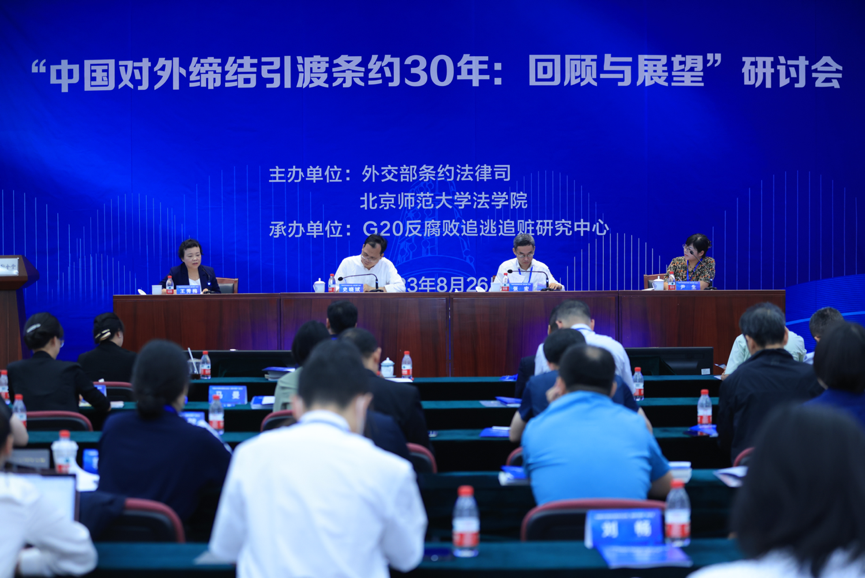
Seminar on Topic 1
Topic 2: Legal Issues in Conclusion of Extradition Treaties with Foreign Countries and Extradition Practice
Seminar on Topic 2 "Legal Issues in Conclusion of Extradition Treaties with Foreign Countries and Extradition Practice" was chaired by Zhang Lei, a professor at the Law School of Beijing Normal University and deputy director of the Research Center on International Cooperation Regarding Persons Sought for Corruption and Asset Recovery in G20 Member States. Yang Zhao, Second-level Inspector of the International Cooperation Bureau of the Central Commission for Discipline Inspection and the National Supervisory Commission, Cao Hua, Deputy Director and Second-level Senior Prosecutor of the International Cooperation Bureau of the Supreme People's Procuratorate, Zhuang Huijuan, Third-level Senior Judge of the Criminal Second Division of the Supreme People's Court, Wang Junxiang, Professor of the Law School of Henan University of Technology, Hu Chengjun, Professor of the Law School of Hunan Normal University, Guo Jing, Associate Researcher of the Shanghai Academy of Social Sciences, and Huang Wenbo, Lecturer of the Party School of the Hubei Provincial Committee of the Communist Party of China, respectively made speeches on the following topics: "The Important Role of Extradition in the Work of Pursuing Fugitives and Recovering Stolen Assets," "Practice and Related Issues in the Extradition Work of Procuratorial Organs," "Commitment Issues and Judicial Review Procedures in Extradition Cooperation," "On the Review of Human Rights Protection Provisions in Extradition Litigation," "The Basis, Obstacles, and Countermeasures for China and the United States to Negotiate a Bilateral Extradition Treaty," "Challenges and Responses of Trial in Absentia in Extradition Practice," and "BRICS Anti-Corruption International Cooperation and China's Role." During the hosting process, Professor Zhang Lei also expressed his views on the important position and role of the extradition system in China's criminal rule of law.
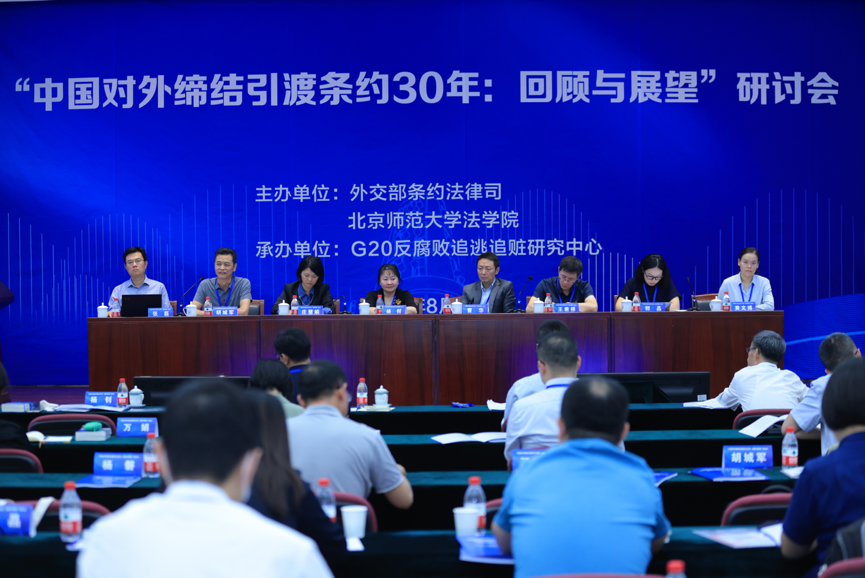
Seminar on Topic 2
Topic 3: Prospects for International Law Enforcement and Judicial Cooperation
Topic 3 "Prospects for International Law Enforcement and Judicial Cooperation" was hosted by Professor Liu Shuang from the Law School of Tianjin University. Gao Junyi, Deputy Director of the Bureau of International Cooperation of the Ministry of Public Security, Sun Ruiyun, Second-level Investigator of the Bureau of International Cooperation of the Ministry of Justice, Huang Yong, Deputy Director of the Criminal Law Office of the Legal Working Committee of the Standing Committee of the National People's Congress, Li Haiying, Professor of the Law School of Jilin University, Ji Ying, Associate Professor of the Law School of the University of International Business and Economics, Jia Yuanchi, lecturer of Guangxi Normal University, respectively made speeches on the following topics: "The Role and Specific Application of Extradition in International Law Enforcement and Judicial Cooperation," "Preliminary Thoughts on the Supporting Regulations for International Criminal Judicial Assistance," "An Overview of the Construction of China's Foreign-Related Criminal Legal System and the Legislation on Extradition Law," "The Current Status, Analysis, and Prospects of the Legal Basis for International Judicial Cooperation on Cybercrime," "An Analysis of the Extradition System between the United States and Canada: Practice and Challenges," and "A Study on the Application Issues of the Non-Extradition of Nationals Principle."
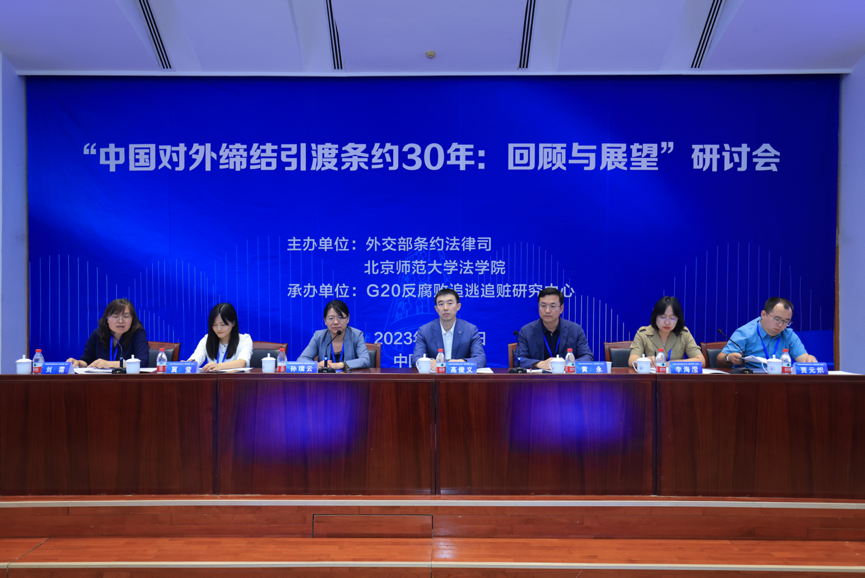
Seminar on Topic 3
Closing Ceremony
The seminar concluded with a closing ceremony led by Associate Professor Zhao Chengguang from the Law School of Beijing Normal University. In his closing address, Gou Haibo, Deputy Director-General of the Department of Treaty and Law at the Ministry of Foreign Affairs, encapsulated the essence of the seminar. He expressed his hope that experts and scholars from both theoretical and practical domains would collaboratively advance the development of China's foreign-related rule of law. The seminar comprehensively reviewed China's experiences and accomplishments in the conclusion of extradition treaties with foreign nations and in international extradition cooperation over the past three decades. The attending delegates unanimously acknowledged that China has successfully established an extradition system that aligns with international norms while retaining Chinese characteristics. Valuable suggestions were made on addressing the challenges faced in China's extradition efforts and on enhancing the quality and efficacy of international law enforcement and judicial cooperation. These insights are of profound importance for the promotion of China's extradition treaty negotiations, as well as for the refinement and progression of extradition legislation and practice.
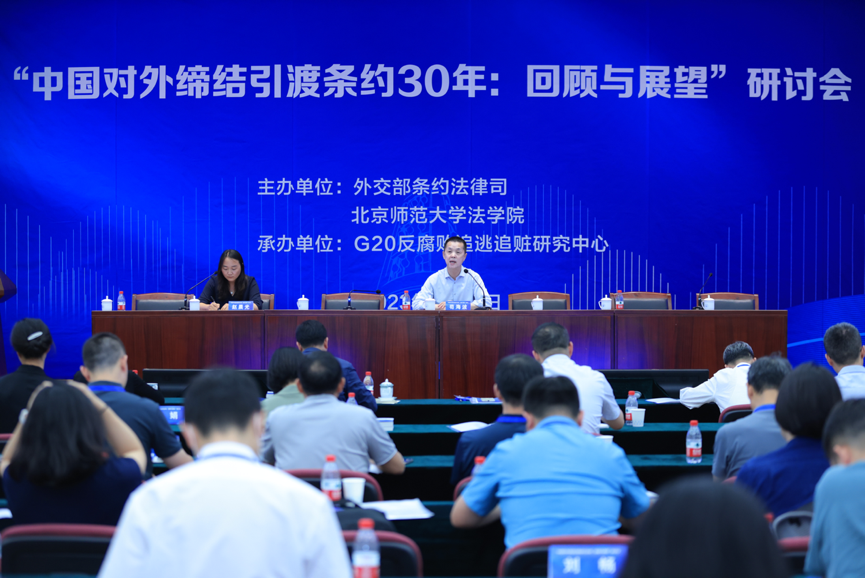
The Closing Ceremony
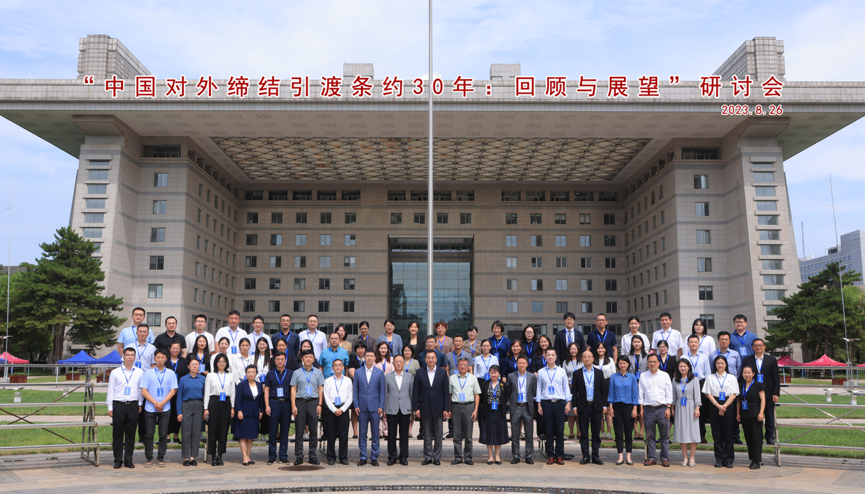
Conference photo
(Contributed by Wang Suyi, a doctoral candidate at the Law School of Beijing Normal University)
